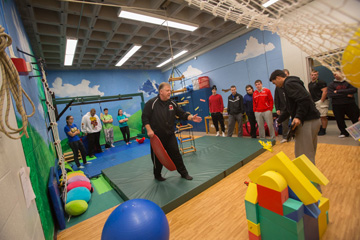
12/15/2015
It’s a given that colleges try to help their students interpret the world around them.
At SUNY Cortland, college students are helping children who have difficulty making sense of the sights, sounds, smells and touch of everyday life.
The College’s growing Sensory Integration Motor Sensory (SIMS) Laboratory is looking for local families with children who need help coping with Sensory Processing Disorder (SPD), a condition in which the brain misinterprets basic sensory information such as sound, touch and movement.
Research studies suggest that one in every six children experiences SPD.
Approximately 40 local families already take advantage of the colorful, playground-like lab, and staff members plan to expand their one-on-one work with SPD-afflicted children in the future. Housed in Park Center, Room 1104, the lab is open to all children and families from surrounding areas.
“We’d always love to take in more children when we can get them in,” said Timothy Davis, the director of the SIMS Lab and an associate professor of physical education at the College.
The lab operates under the premise that every child manages sensory input differently, especially those with SPD. The condition sometimes is compared to a neurological traffic jam in that it prevents certain parts of the brain from receiving the information needed to interpret sensory information correctly.
Someone with SPD may over-respond to triggers such as clothing, physical contact or even food. Some participants struggle with loud noises or changes in lighting.
The same intervention doesn’t always work with every child, so SIMS Lab staff members work with each child individually to pinpoint the strategies that work best in learning self-regulating behaviors. Children participate in sensory integration experiences through a variety of fun activities, including balance practice, tactile exercises and other stimuli work that can complement existing occupational or physical therapy goals.
“It’s very cross disciplinary,” Davis said. “We’re really focused on a team approach to improving the self-regulatory behavior of kids to give them the need. Overall, it’s a really positive experience for everyone involved.”
In a given week, 10 to 15 different student volunteers and additional staff members will work with children. SUNY Cortland students represent majors that include physical education, exercise science, speech and hearing science, early childhood education, special education, therapeutic recreation and other related areas of study.
Graduate students in the College’s Communication Sciences and Disorders Department as well as occupational therapy students from Ithaca College also make valuable contributions.
A typical SIMS Lab session involves one-on-one interaction with a child for 30 to 45 minutes. First sessions include sensory and motor skill evaluation and observation to determine a child’s specific sensory needs. A series of sensory activities then are prescribed to help a child move closer to learning self-regulatory behavior.
Parents and guardians often notice that their children are more comfortable and less afraid of tactile stimuli after just one visit to the SIMS Lab.
“The best part about it, quite honestly, is to have a parent come back and say something like, ‘Oh my gosh, his behavior’s so much better in class and he’s doing so much better in school,’” Davis said.
To learn more about the SIMS Lab and its work, contact Davis; Alexis Abdo, the SIMS Lab program coordinator; or follow its Twitter account @SIMS_Lab.